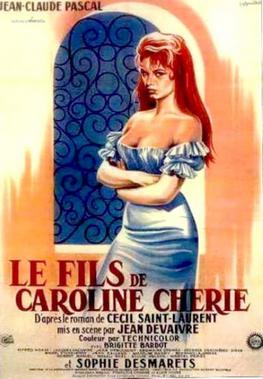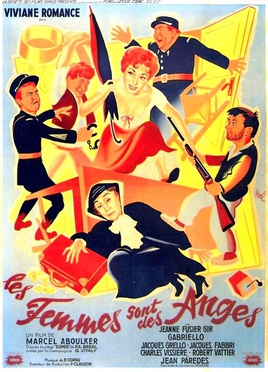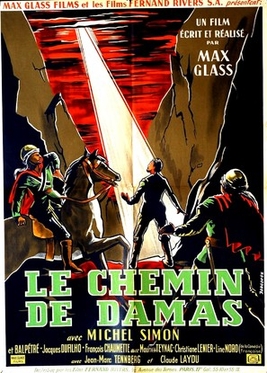
Viviane Romance was a French actress.

Maurice Ronet was a French film actor, director, and writer.

Peter van Eyck was a German-American film and television actor. Born in Prussian Pomerania, he moved to the United States in the 1930s and established a career as a character actor. After World War II, he returned to his native country and became a star of West German cinema.

We Are All Murderers is a 1952 French-Italian crime drama film written and directed by André Cayatte and starring Marcel Mouloudji, Raymond Pellegrin and Claude Laydu. It was shot at the Boulogne Studios in Paris. The film's sets were designed by the art director Jacques Colombier. It tells the story of René, a young man from the slums, trained by the French Resistance in World War II to kill Germans. He continues to kill long after the war has ended, as it is all he knows.It was entered into the 1952 Cannes Film Festival and won the Special Jury Prize.

Claude Laydu was a Belgian-born Swiss actor on stage and in films. He was renowned for his performance in his film debut in the role of the young priest in Robert Bresson's Diary of a Country Priest (1951), which has been described as one of the greatest in the history of film.

Vénus aveugle is a 1941 French film melodrama, directed by Abel Gance, and one of the first films to be undertaken in France during the German occupation.
Xavier Gélin was a French actor and film producer, and son of French film star Daniel Gélin and actress-producer Danièle Delorme. Through his father, he was a half-brother of Fiona Gélin and Maria Schneider, also actresses. Gélin, a French actor and a mainstay of popular French cinema for more than three decades, died of cancer at the age of 53.

Caroline and the Rebels is a 1955 French historical adventure film directed by Jean Devaivre and starring Jean-Claude Pascal, Sophie Desmarets and Brigitte Bardot. It is loosely part of the Caroline chérie film series, although the character never actually appears and is seen only in a miniature.

A Friend Will Come Tonight is a 1946 French drama film directed by Raymond Bernard and starring Michel Simon, Madeleine Sologne and Paul Bernard. The film's sets were designed by the art director Robert Gys.

The Gorillas is a 1964 French comedy film directed by Jean Girault and starring Darry Cowl, Francis Blanche and Bernard Dhéran. It was shot at the Billancourt Studios in Paris. The film's sets were designed by the art director Sydney Bettex.

Return to Paradise is a 1935 French comedy film directed by Serge de Poligny and starring Claude Dauphin, Mary Morgan and Marcel André. The film's sets were designed by the art director Pierre Schild.

A Woman in the Night is a 1943 French drama film directed by Edmond T. Gréville and starring Viviane Romance, Georges Flamant and Claude Dauphin. The film's sets were designed by the art director Jean Douarinou.

Montmartre is a 1941 French romantic comedy film directed by Georges Lacombe and starring Édith Piaf, Jean-Louis Barrault and Roger Duchesne.

Crossroads of Passion is a 1948 French-Italian drama film directed by Ettore Giannini and Henri Calef and starring Viviane Romance, Clément Duhour and Valentina Cortese. The film's sets were designed by the art director Guido Fiorini.
Jean Josipovici (1914–1992) was a French screenwriter and film director. The son of a diplomat, he spent much of his youth in Egypt. He was married to the actress Viviane Romance who he directed in three films. After their divorce, he relocated to Italy.

Women Are Angels is a 1952 French comedy film directed by Marcel Aboulker and starring Viviane Romance, Jeanne Fusier-Gir and André Gabriello. The film's sets were designed by the art director Georges Petitot.

Anyone Can Kill Me is a 1957 French-Italian crime drama film directed by Henri Decoin and starring François Périer, Peter van Eyck and Anouk Aimée. It was shot at the Epinay Studios in Paris. The film's sets were designed by the art director Raymond Gabutti.

The Road to Damascus is a 1952 French historical drama film directed by Max Glass and starring Michel Simon, Antoine Balpêtré and Jean-Marc Tennberg. It was shot at the Joinville Studios in Paris. The film's sets were designed by the art director Guy de Gastyne.

Midnight Tradition is a 1939 French mystery thriller film directed by Roger Richebé and starring Viviane Romance, Georges Flamant and Marcel Dalio. It is based on the 1930 novel of the same title by Pierre Mac Orlan. It was shot at the Neuilly Studios in Paris. The film's sets were designed by the art directors René Renoux and Roland Quignon.

The Wheel is a 1957 French drama film directed by Maurice Delbez and André Haguet and starring Jean Servais, Pierre Mondy and Catherine Anouilh. The film's sets were designed by the art director Lucien Aguettand. It is a remake of the 1923 film of the same title directed by Abel Gance.


















